- Your cart is empty
- Continue Shopping
Gene Synthesis
Gene Synthesis
With professional research teams and effective systems in place, Synbio Technologies provides our customers with one-stop
shop. We have developed the most comprehensive platforms of oligo synthesis, gene synthesis (fragment and clonal genes)
and next-generation high-throughput gene synthesis to meet our customers’ needs in quality, speed, budget, and applications.
We routinely synthesize over 3 million base pairs of gene sequences each month for a wide range of applications including
protein production, antibody discovery, genetically engineered vaccine, molecular breeding, biofuel, etc.
Competitive Advantages
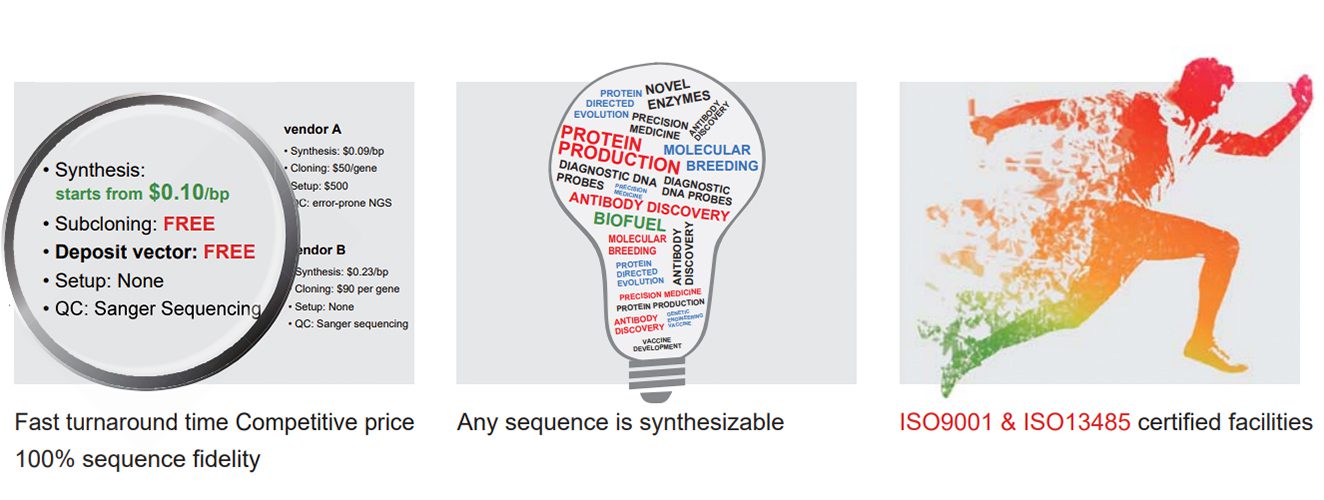
Gene Synthesis Services
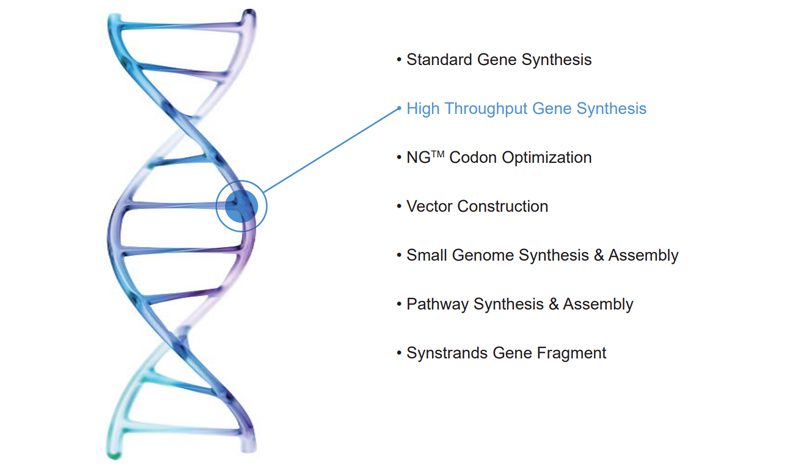
◆ Standard Gene Synthesis Process
According to the DNA or amino acid sequences customers provided, our scientists will design the oligos and the procedure
of fragment assembly and cloning within 30 minutes. By using our automated system that guarantees efficient and error-free
synthesis, our customers will be provided with the highest quality output. Sanger sequencing will be conducted to verify
100% sequence accuracy.

◆ Gene Synthesis Service Specifications
The following turnaround time only applies to the non-complex sequences. Gene products will be cloned into our default
pUC57-Amp or pUC57-Kan vectors with multiple cloning sites. We can also clone genes into customers’ supplied vectors
upon request.

2.1 NGTM Codon Optimization Technology
Codon optimization is a method of utilizing preferred codons to increase overall sequence stability and resulting protein
expression. This is accomplished by avoiding rare codons with low utilization, simplifying the mRNA’s secondary structure
and adjusting the GC overall content. The increased commercialization of gene synthesis has greatly promoted the application
and influence of codon optimization. Synbio Technologies, patent pending NG™ Codon Optimization Technology optimizes
complex sequences resulting in a significantly higher protein expression level
This platform takes into consideration the below factors:
• Cryptic splice sites
• Poly(N)
• Repeats
• RNA secondary structures
• Killer sequences
• Internal RBS sites
• GC content
Benefits
Available for any hosts for improving protein expression level.
Excellent results for the most challenging sequences.
Intellectual property (IP) protection.
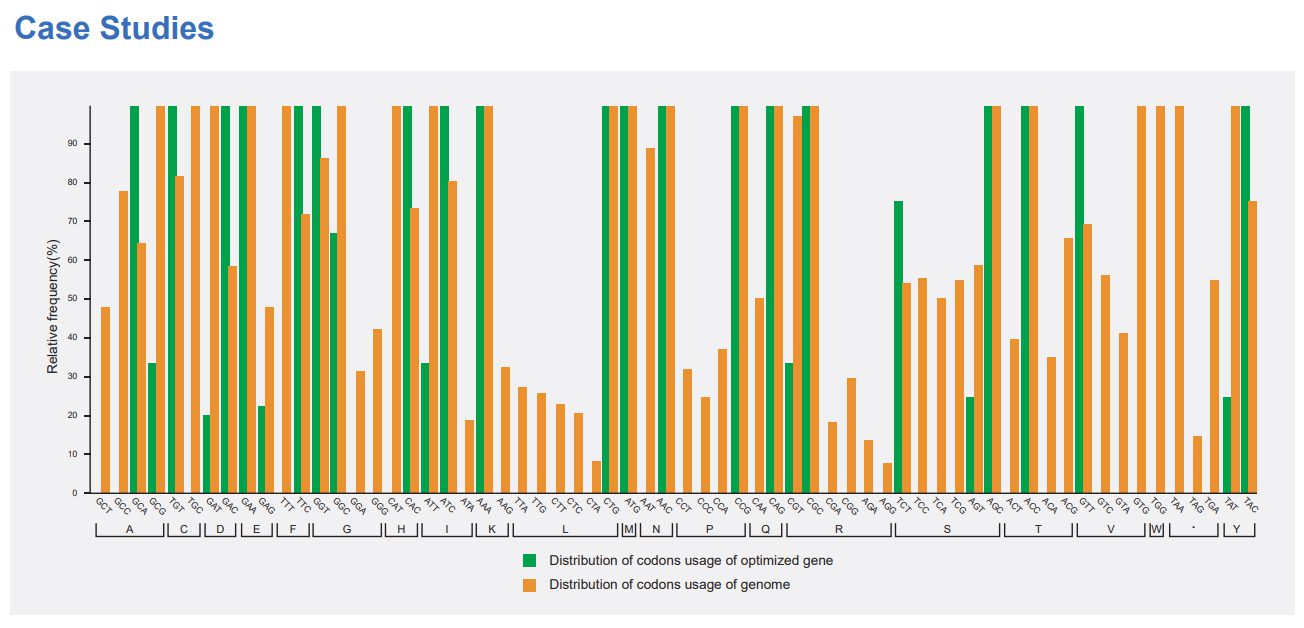
NGTM Codon improves codon usage efficiency. The Y and X axis represent relative usage frequency of codons and the genetic codons respectively. The codon usage (orange bars) is rather dispersed compared to the optimized one (green bars). Our proprietary NGTM codon optimization algorithm greatly improves codon usage efficiency and satisfies different customers’ requirements.
2.2 Pathway Synthesis & Assembly
The synthesis and construction of metabolic pathways as well as diverse DNA assembly technologies play fundamental
roles in microbiology, biochemistry, and many other relevant fields. With their rapid development, the price of large DNA
fragment or plasmid synthesis is decreasing year by year. Based on Syno® gene synthesis tools and excellent long DNA
assembly capability, Synbio Technologies is confident in providing professional technical support for metabolic pathway
synthesis and library assembly
Services Specifications

Case Study
The promoter library’s diversity determines the final diversity of the constructed library. The theoretical library capacity is
100, with 100 times coverage, leading to the production of 10,000 clones. Our PCR test of the bacterial solution showed
78% positive and 100% accuracy.
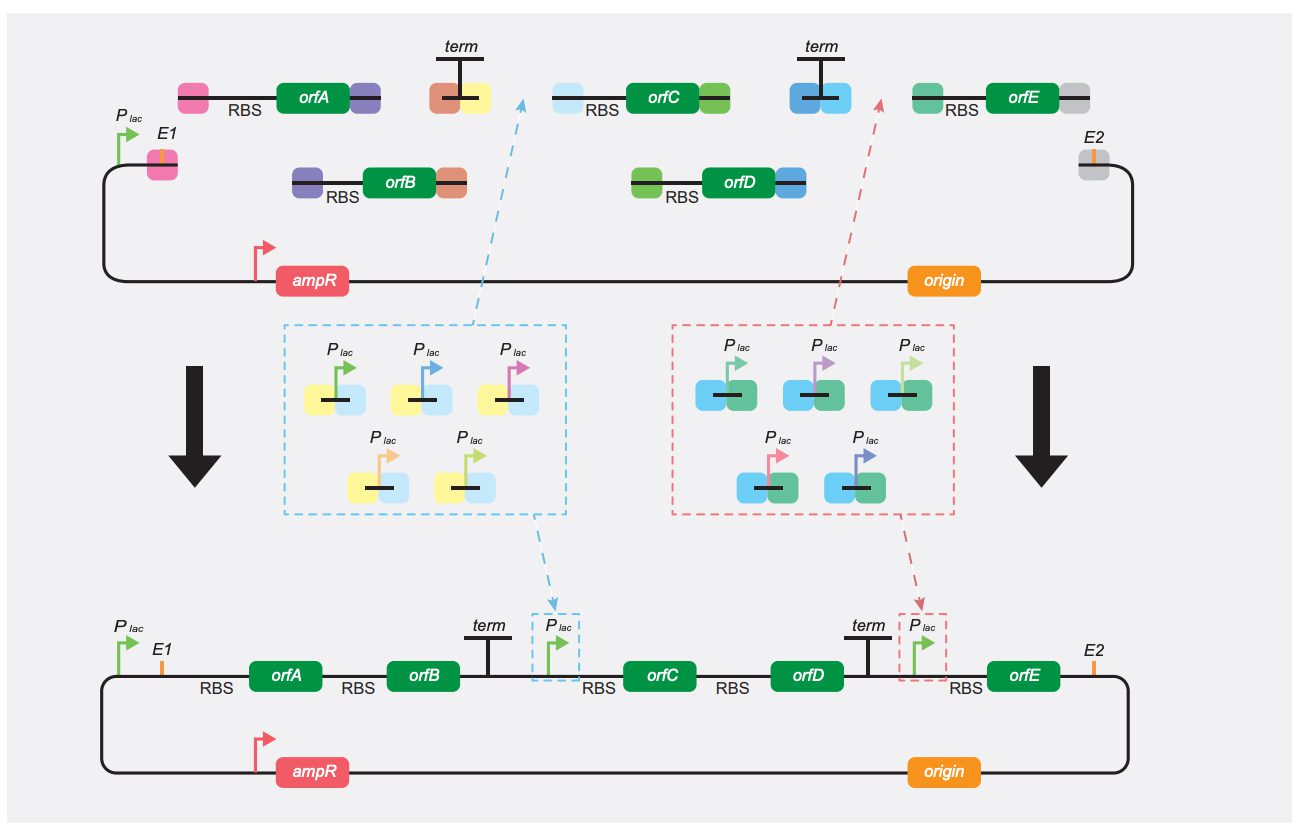
2.3 Small Genome Synthesis & Assembly
The rapid development of synthetic biology has allowed the researchers to place greater emphasis on powerful concepts
and techniques within the field itself. These techniques include the comprehensive analysis of complex pathways and the
re-design of natural biological systems, such as Gibson Assembly. Currently, Gibson Assembly is the most popular mechanism
of achieving directed cloning and in vitro multiple-segment assembly. However, Gibson assembly is limited to plasmids
around 10 Kb or less in length, which largely restricts its applications within certain aspects of synthetic biology.
Several researchers discovered that assembly in yeast has the potential to conveniently assemble large DNA segments
with ease. This is because yeast can connect multiple DNA segments automatically without DNA polymerases and ligases.
This aspect in yeast made it possible to circumvent the length restriction associated with Gibson Assembly, and efficiently
construct a plasmid over 10kb in length. For this reason, yeast homologous recombination technologies are greatly beneficial
for efficient and effective assembly of long DNA fragments and genomes.
Competitive Advantages
Powerful gene synthesis platforms provide one-stop solutions for yeast assembly platforms such as gene synthesis, assembly and sequencing.
Synthesis and assembly of long DNA fragments with high fidelity and speed. Synbio Technologies can deliver single gene sequences up to 150 Kb, guaranteeing reliable assembly of long DNA fragments.
Services Specifications

By utilizing yeast homologous recombination technology, Synbio Technologies is able to provide one-stop services for long
gene synthesis/assembly and gene cluster/small genome synthesis and assembly.
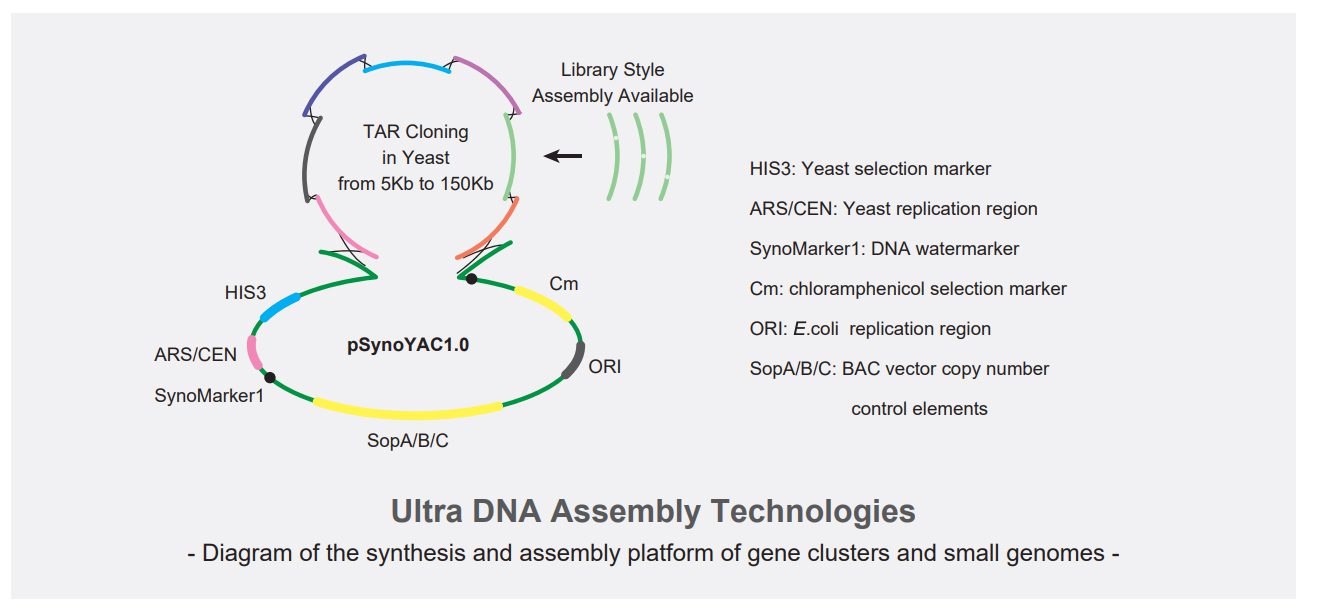
2.4 Vector Construction
Based on our Syno® synthesis platforms, Synbio Technologies will deliver any synthetic vector with high accuracy and an
economical price, especially those for research in shRNA, TALENT, and CRISPR-Cas9 projects.
1. shRNA Construction and Validation
RNA interference (RNAi) blocks transcription and translation and inhibits gene expression by introducing double stranded
RNA. RNAi is a quick, convenient, and effective method which is widely used to down-regulate gene expression. Using shRNA
to silence a target gene of choice, RNAi is immensely useful in disease studies of viruses, tumors, and genetic disorders.
Services Specifications
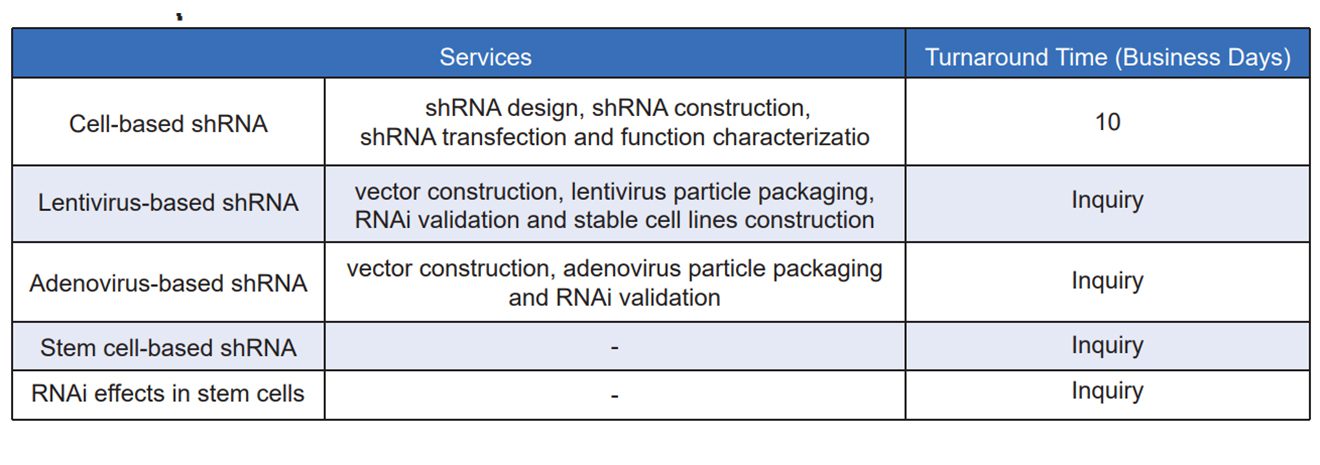
2. TALEN Construction and Validation
Transcription activator-like effector nuclease (TALEN) is a molecular tool frequently used for genome editing due to its
ability to cut target genes precisely, leading to highly accurate gene editing. The TALEN system provides an easier, simpler,
and more affordable method of gene silencing than zinc finger nuclease (ZFN) technology. This is because the TALEN
effector protein can specifically bind to most nucleic sequences while ZFN is more limited in its recognition and is often
affected by adjacent downstream and upstream sequences. For this reason, Synbio Technologies offers its customers
high-quality TALEN services to achieve the genome modifications specific to their research requests.
Services Specifications

3. CRISPR-Cas9 Construction and Validation
CRISPR-Cas9 gRNA (CRISPR-Cas9 RNA-Guided nuclease) is the most recent, and most effective, method of genome
editing technologies. Previous studies indicate that the on-target gene knockout rates were higher than that of the TALEN
and ZFN. This is because CRSPR can precisely edit RNA sequence through the RNA-directed Cas9, making the process
both highly specified and effective. The construction of Cas9 is also easier and more convenient when compared to the
traditional methods of genome modification. The CRISPR-Cas9 system has been widely applied in animal and plant breeding,
directed evolution, and the site-specific restoration of genetic diseases. Synbio Technologies offers construction and validation
of the CRISPR-Cas9 system through our patent pending Syno® 2.0 Platform in a highly efficient and cost-effective way
Applications
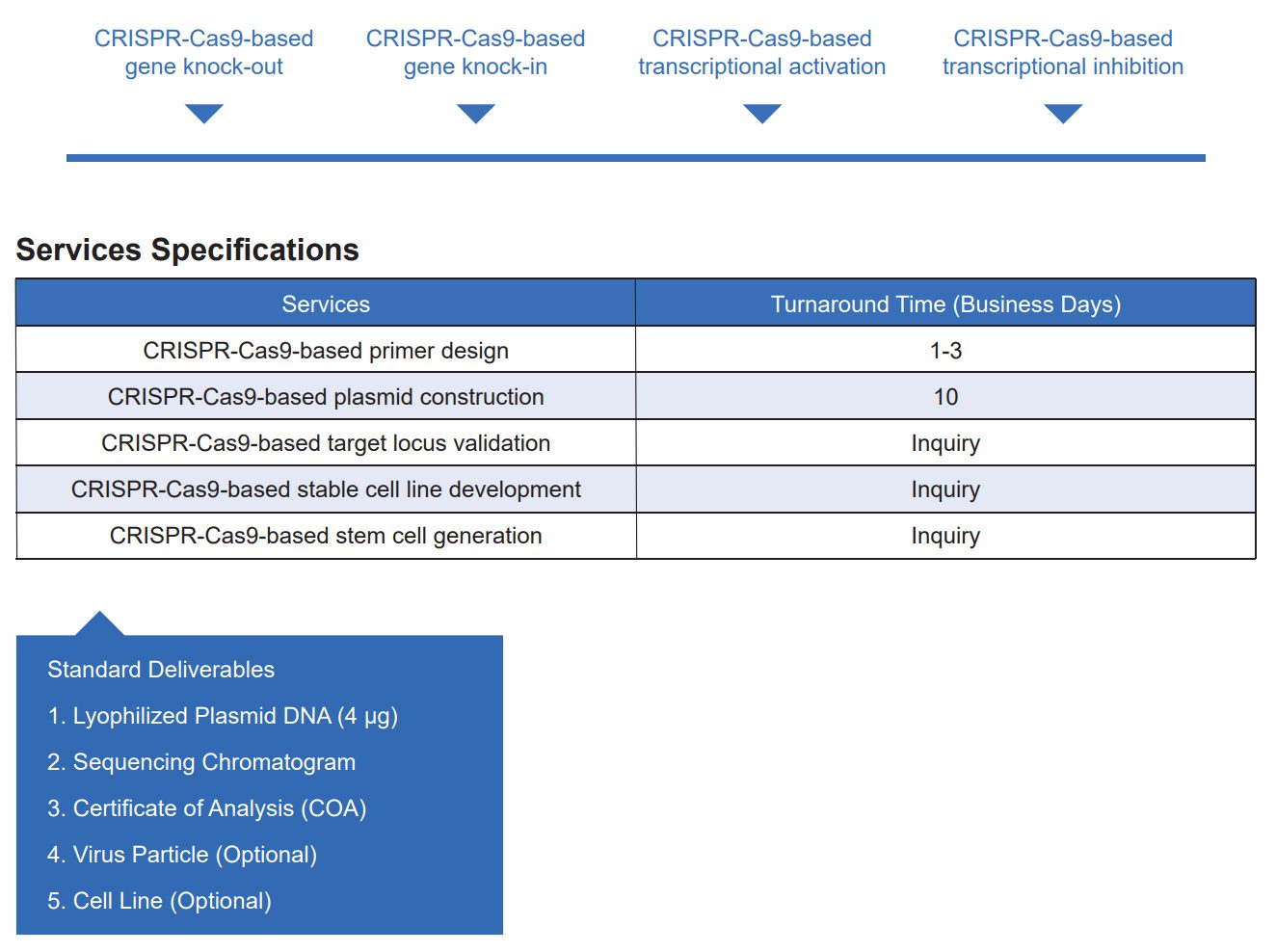
2.5 Synstrands Gene/DNA Fragments
Synbio Technologies supplies our customers with double-stranded, sequence-verified Synstrands Gene Fragments in only
a few business days. These fragments offer an affordable and accessible construction or modifications of genetic sequences.
The various applications include antibody research and CRISPR-mediated gene/genome editing, being used as qPCR
standards, etc. Synstrands Gene Fragments are available in two delivery forms: Eppendorf tubes or plates.
Competitive Advantages
Cost-effective approach
Fragment synthesis is cheaper and sometimes halves the price of synthetic genes synthesis; Competitive prices without
sacrificing the overall quality.
No sequence restriction
Some sequences may be denied when running through the complexity test from our competitors. By applying different synthesis
strategies, our comprehensive platform is capable of synthesizing any complex sequence.
Error-free option
DNA fragments are PCR products which contain certain error rate by its nature. We offer this basic option with very competitive
price staring from $0.09/bp. Customers can request error-free fragments for their experiments with higher standards.
Subcloning and sequencing
Construction of a plasmid can be tedious and stressful, especially with a tight timeline. We provide subcloning with vectors
of your choice and Sanger sequencing to ensure 100% sequence accuracy. Subcloning is free if your vector is under 6 kb.
Free codon optimization
Improves the synthesis feasibility
Applications
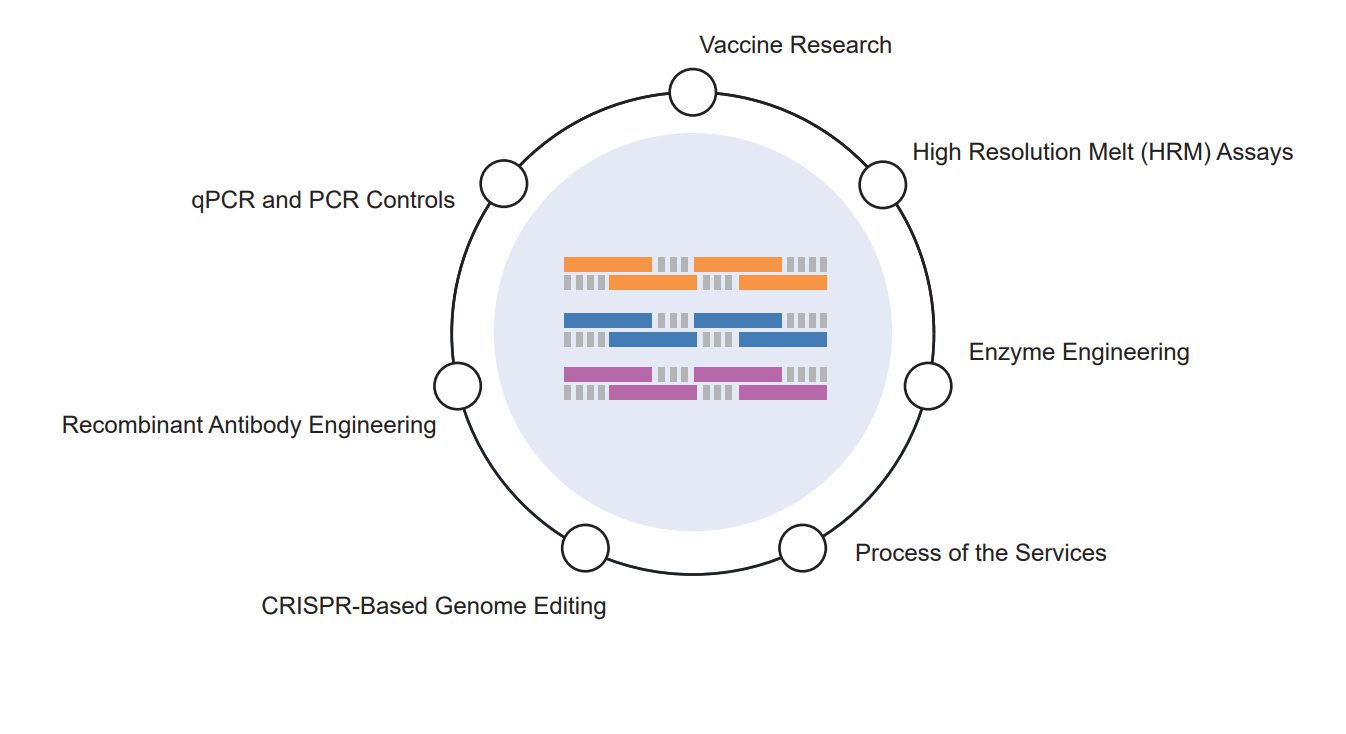
Synbio Technologies independently developed a CI sequence difficulty index system, which can facilitate the accurate,
fast, and high-quality synthesis of any sequence.
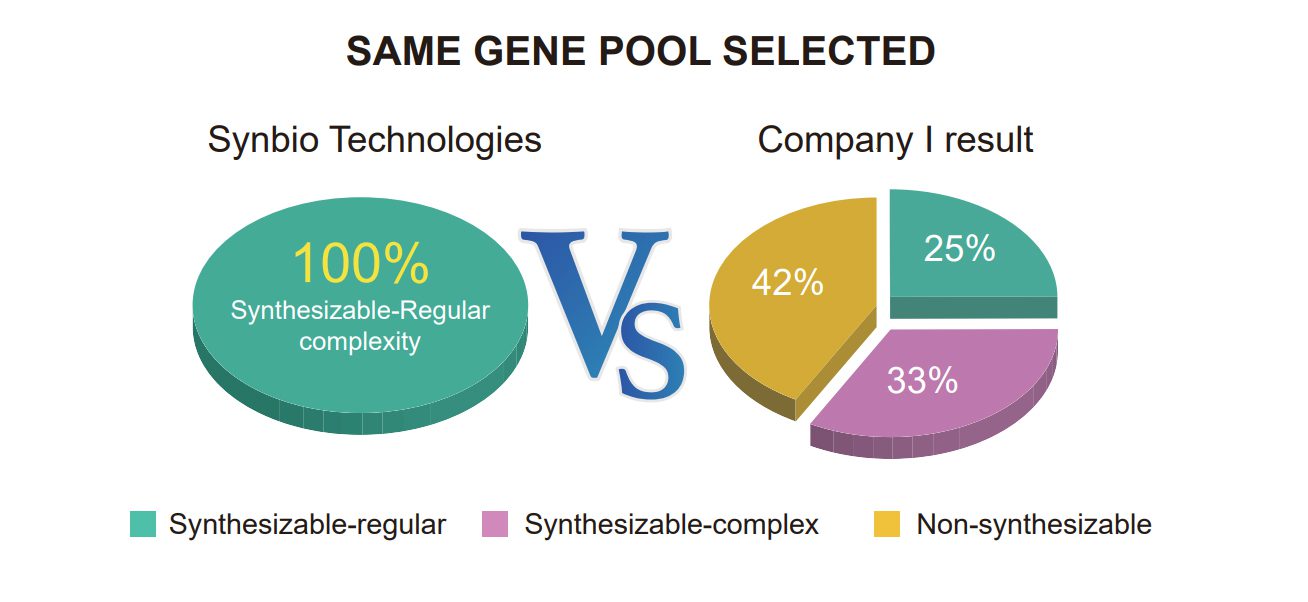
Process of the Service

Service Specifications

2.6 Next Generation Gene Synthesis
Synthetic biology derives from a long-envisioned goal of creating, controlling, and programming intricate biological systems.
By leveraging precise electrochemical technology, massive on-chip parallel synthesis, and off-chip UltraTM Assembly technology,
the next-generation DNA synthesis platform enables synthesizing of over 500,000 nucleobases and building DNA strands
as long as 30,000bp on a single chip with one synthetic circle.
The proprietary UltraTM Assembly technology developed at Synbio Technologies has overcome several limitations in synthesizing
large and complex DNA constructs such as gene clusters, pathways, and genomes. Synbio Technologies has manufactured
and supplied more than 1 hundred base pairs of 10 Kb-long synthetic DNA strands for Synthetic Yeast 2.0 (Sc 2.0) Project
in an efficient and low-cost manner. The next generation DNA synthesis platform has successfully assembled 1kb-long synthetic
DNA strands for metabolic and synthetic biology research.
Services Specifications

Applications

Want To Inquire About The Services?
Contact Us

THE ATLANTIS BIOSCIENCE DIFFERENCE Discover Translational Solutions To Advance From Bench to Bed
GET SUPPORT Whenever You Need It

QUESTIONS IN YOUR MIND?
Connect With Our Technical Specialist.

KNOW WHAT YOU WANT?
Request For A Quotaiton





